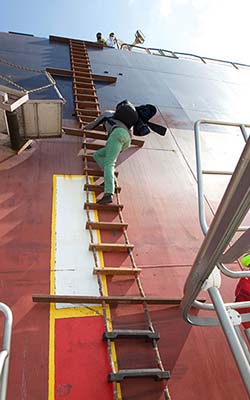Seeärztlicher Dienst
Brandstwiete 1
20457 Hamburg
Phone: +49 40 361 37-365
Fax: +49 40 361 37-333
Mail: seeaerztlicher-dienst@bg-verkehr.de

Dr. Jörg Abel
Phone: +49 40 36137-336
Fax: +49 40 36137-333
Mail: joerg.abel@bg-verkehr.de

Beate Bahl
Phone: + 49 40 36137-338
Fax: +49 40 36137-333
Mail: beate.bahl@bg-verkehr.de

Dr. Markus Neumann
Phone: +49 40 36137-278
Mail: markus.neumann@bg-verkehr.de

Ana Strickert
Phone: +49 40 36137-365
Mail: ana.strickert@bg-verkehr

Annelie Ewen
Phone: +49 40 36137-252
Fax: +49 40 36137-333
Mail: annelie.ewen@bg-verkehr.de

Jan Schultz
Phone: +49 40 36137-335
Fax: +49 40 36137-333
Mail: jan.schultz@bg-verkehr.de
Kolinda Cinfe
Phone: +49 40 36137-350
Fax: +49 40 36137-333
Mail: kolinda.cinfe@bg-verkehr.de
Marina Staude
Phone: +49 40 36137-340
Fax: +49 40 36137-333
Mail: marina.staude@bg-verkehr.de
Examination: process · costs
Documents for a medical sea pilot examination
Please bring the following documents to your medical sea pilot examination:
Always:
- Your identification card or passport,
- the completed medical fitness questionnaire (before the examination, it would be great if you could fill in the questionnaire taking your time),
If applicable, in case you
- wear glasses or contact lenses: bring them along for the eyesight test,
- have any acute or previous illnesses that are not older than 2 years: submit recent examination results and a current list of medication from your doctor,
- are under 18 years of age: signature of your parents (legal guardians) on the bottom right of the medical fitness questionnaire.
Process of the medical sea pilot examination
Firstly, you will need to make an appointment for the medical fitness examination with one of our respectively recognized medical practitioners.
Before your examination download the medical fitness questionnaire and complete it accurately. If you are under 18 years of age, have your parents sign as well. Please note the other documents you will need to bring to the examination.
At the day of the examination, present the questionnaire to the practice performing the examination. Right before the examination, you will be asked to show your personal identification or passport to verify your identity.
At the beginning of the examination, the physician will go through the details on the questionnaire with you. After that, a hearing test as well as a physical examination including a blood and urine laboratory test and stress ECG will be performed. In addition, your blood pressure, heart frequency, height, weight and body mass index will be determined. The scope of the examination is listed in the German "Seelotseignungsverordnung" Annex 1 (in German only). In case of pre-exiting conditions and doubts regarding your fitness as sea pilot, the physician may perform or arrange for additional examinations.
If the doctor determines the medical fitness as sea pilot, you will receive a German Pilot Certificate of Fitness. Depending on your medical condition, the certificate may include conditions or restrictions. The certificate is valid for a maximum of three years; in case of health-related restrictions, the doctor may set a shortened period of validity.
If you are unsuitable to become a sea pilot, the physician will issue to this effect. You can have this result verified by the Maritime Medical Service for a fee.
Provisions for the medical fitness as sea pilot
The medical provisions for sea pilots are stipulated:
- in the German "Seelotsgesetz" (sea pilot act),
- in the German "Seelotseignungsverordnung" (sea pilot medical fitness and psychological aptitude ordinance SeeLotsEigV) and
- very detailed in the German Maritime Medical Ordinance Annex 1 to which the SeeLotsEigV refers.
For the most part, sea pilots have to fulfil the following health requirements:
- Fitness for sea service for deck service (navigational) as a basis,
- No considerable health impairment according to the medical examination specifically for sea pilots (SeeLotsEigV Annex 1 Section III),
- Sufficient contrast vision during twilight (contrast setting of mesoptic visual acuity at least 1:5 without and with glare)
- No language or speech impairments (most of all no impairment to give clear and coherent instructions),
- satisfactory performance of the cardiovascular system (verified by stress ECG),
- no health limitations (at least to the requirements of column 4 of table 6.2 of Annex 1 of the German Maritime Medicine Regulations)
For overseas sea pilots the same provisions apply, however, the health limitation "coastal voyages only" is inadmissible.
Yes, if you fulfil the minimum eyesight standard. You need to have a visual acuity of at least 0.1 of the decimal calculation method on each eye. In addition, you need to reach a visual acuity of at least 0.7 on one eye and on the other a visual acuity of 0.5 with or without visual aid.
Someone is unfit for service as sea pilot if he or she, among other things,
- has very poor eyesight and insufficient contrast vision during twilight,
- has red-green colour blindness (for deck department and technical department),
- has a language or speech impairment, in particular an impairment to give clear and coherent instructions on board,
- displays unsatisfactory performance of the cardiovascular system,
- takes medication or has a health condition that significantly limits him or her physically or mentally,
- has a body mass index of over 40 kg/m2.
The details of this are given in the German "Seelotseignungsverordnung" and Annex 1 (in German only) of the German Maritime Medicine Regulations.
No there is no difference with regard to the fitness for service as sea pilot whether you are only applying to become a sea pilot, you are a sea pilot aspirant or have been working as a sea pilot for a long time.
Cost of the sea pilot medical fitness examination
The sea pilot medical fitness examination costs about 190 Euros including the German Pilot Certificate of Fitness. If you are applying to become a sea pilot, the costs for the psychological aptitude test are an additional 150 Euros.
FAQ medical sea pilot examinations
Does my previous certificate remain valid after the "Seelotseignungsverordnung" enters into force?
Yes, previous certificates remain valid after the "Seelotseignungsverordnung" enters into force. Only once the certificate's validity ends, does the certificate need to be renewed
.
How long is a German Pilot Certificate of Fitness valid for?
A new German Pilot Certificate of Fitness is valid for three years. In case of health restrictions, a recognized medical practitioner may determine a shorter period of validity.
Certificates that were issued in accordance with the former "Seelotsuntersuchungsverordnung" (= up to 27 May 2022) remain vaild.
When does the period of validity of a newly issued certificate begin?
The period of validity of a new Pilot Certificate of Fitness begins on the day the medical fitness examination for sea pilots concludes, i.e. not when the validity of the previous certificates ends. The date of issue and the expiry date are given on each newly issued certificate.
Will I be informed automatically when my certificate is about to expire or requires renewal?
No, just like before, sea pilots are responsible themselves to hold a valid Pilot Certificate of Fitness.
Where can I be examined for my medical fitness for sea pilots?
Only medical practitioners recognized by the Maritime Medical Service of the BG Verkehr may perform medical fitness examination for sea pilots. Only these physicians have enough experience with examining sea pilots. A map and an index of these physicians can be found on www.deutsche-flagge.de.
Does the Maritime Medical Service of the BG Verkehr in Hamburg perform medical fitness examination for sea pilots?
The physicians of the Maritime Medical Service only perform examinations in exceptional cases, e.g. in case of verification of an objection. All other medical fitness examination for sea pilots are done by recognized medical practitioners (including examination of sea pilot aspirants).
Do the blood and liver levels and the stress ECG always have to be taken/conducted with a recognized medical practitioner?
No, if you have recently undergone these tests with another physician, you do not need to do these tests again with a recognized medical practitioner. It is important, however, that the results are complete and can be assigned unambiguously to the person examined.
What are the most important changes in terms of medical requirements that have been introduced by the "Seelotseignungsverordnung"?
The most important changes in terms of medical requirements introduced by the "Seelotseignungsverordnung" are the introduction of a stress ECG (previously it was a resting ECG) and the extension of the examination of 4 blood levels (ALT, AST, HbA1, creatinine). The exact extend of the examination is given in Annex 1 of the "Seelotseignungsverordnung".
Why is a stress ECG required?
Sea pilots have to have a basic level of fitness in order to perform their job, for example to climb up and down the pilot ladder without any problems. With a stress ECG, possible health issues such as a heart condition can be detected reliably in accordance with scientific standards. Therefore, the examination provides a protection for the sea pilot him- or herself and ensures safe piloting for safe maritime navigation at any time.
Which requirements apply for the stress ECG?
The requirements for the stress ECG of sea pilots follow the state of scientific knowledge, currently this is in accordance with the guidance "Leitfaden für die Ergometrie bei arbeitsmedizinischen Vorsorgeuntersuchungen nach DGUV Grundsätzen" by the German Social Accident Insurance (DGUV) from October 2014. The stress ECG is conducted in a sitting position on a bicycle ergometer. The maximum performance (in watts) depends on sex, age and weight of the person examined. For example, a 50-year old man weighting 80 kg has to achieve a maximum performance of 170 watts.
Does the stress ECG replace the provisions regarding the body mass index?
No, sea pilots have to meet both the provisions for the stress ECG as well as the body mass index (BMI), because each method can detect different medical conditions. A stress ECG can identify potential heart diseases and arterial hypertension. A BMI of 40 kg/m2 and above (= exclusion from fitness as sea pilot) is categorized as severe obesity (Class III) where the risks for accompanying illnesses (comorbidities) is especially high. These accompanying illnesses do not only comprise cardio-vascular diseases but also metabolic disorders (e.g. diabetes mellitus type 2), diseases of the musculoskeletal system (e.g. knee and hip arthrosis) or organ diseases (e.g. kidneys, liver or gall bladder).
I have elevated creatinine levels because I do lots of sport. Is that a problem for my fitness as sea pilot?
No, if the reason for the elevated creatinine levels is intensive exercising and this can be proven, there is no issues for the fitness as sea pilot. The individual health of the person examined are taken into consideration when evaluating the limit values.
Why are there no stricter health requirements for sea pilot aspirants in comparison to sea pilots anymore?
The previous assumption that older sea pilots can only meet the health requirements if stricter requirements apply for career starters (sea pilot aspirants) was unsubstantiated. It is essential that all sea pilots meet minimum health standards regardless of their age. Moreover, the harmonisation of the requirements of career starters and experienced sea pilots in the Maritime Medicine Regulations in 2014 has proven its worth. Therefore, the previously stricter requirements for sea pilot aspirants have been aligned in the "Seelotseignungsverordnung".
Which rules apply for sea pilots operating outside of the pilotage regions?
The same provisions apply as for sea pilots inside the pilotage regions. Long-range sea pilots may not have any additional medical limitations in accordance with the German Maritime Medicine Regulations annex 1 table 6.2 column 5. This concerns listed health disorders that would exclude from employment on sea-going vessels on worldwide voyages.
What happens if I have been found unfit for service as sea pilot?
If a sea pilot wants to have his certificate renewed and the recognized medical practitioner has found him or her to be unfit for service as sea pilot, the sea pilot can apply for revision at the Maritime Medical Service (Seeärztlicher Dienst). If the unfitness is confirmed, the Maritime Medical Service will issue a decision to which the sea pilot may file an objection. If the objection is not redressed, the sea pilot may file a complaint at the Administrative Court Hamburg.
Is a temporary unfitness limited to a period of time?
No, a seafarer can be temporarily unfit for a longer period of time. The recognized medical practitioner should give, if possible, a prognosis as to how long the sea pilot will be temporarily unfit. However, for some health disorders (e.g. psychological diseases) such a prognosis is very difficult to make.
What happens if a sea pilot has a valid certificate but doubts have been raised regarding his or her fitness as sea pilot?
The Maritime Medical Service can order an examination for a sea pilot if there is reason to believe that he or she might be unfit (German "Seelotsgesetz" sec. 13 para. 4 sent. 1). If the examination shows that the sea pilot does not meet the requirements e.g. due to a deterioration of his or her health condition in the meantime, the Maritime Medical Service will declare the pilot's medical certificate as invalid and inform the supervisory authority.
Does a pregnancy exclude from fitness as sea pilot?
Yes, for medical reasons, a pregnant sea pilot cannot be found fit for service as sea pilot. A sea pilot's duties pose risks for the sea pilot herself, for her unborn child as well as the safety of maritime navigation. Some of the risks can occur during the entire pregnancy others will usually emerge at certain stages of the pregnancy. In case of unfavourable medical complications and, depending on the location of the ship to be guided or the weather conditions (e.g. storm, high waves), it cannot always be guaranteed that the sea pilot would be able to perform her pilot's consultation, at least till a replacement can take over. An immediate transfer onshore might not be possible for several hours.

